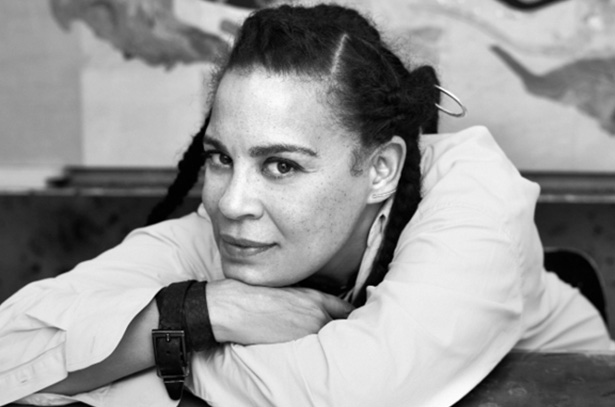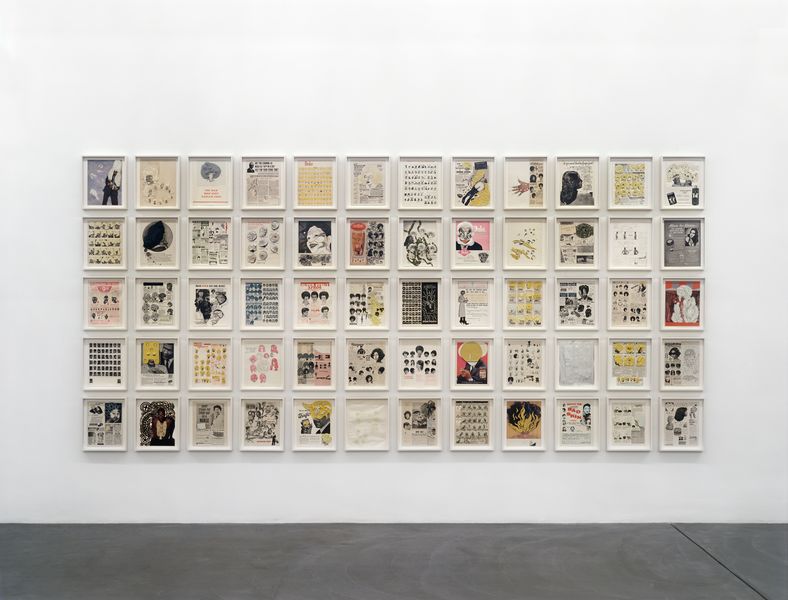Ellen Gallagher’s art explores issues of race, identity and transformation. Renowned for her reworking of popular black imagery, Gallagher draws on postwar printed, film and musical culture. She makes repeated reference to the traditions of blackface and minstrelsy, as well as to specific performers such as vaudeville star Bert Williams and jazz musician Sun Ra. Pages from mid-century black photomagazines such as Ebony, Our World and Sepia - all dominated by advertisements for Afro hairstyles, wigs and skin products aimed at the African-American woman - are frequent sources in her investigation of the anxieties and tensions that surrounded black identity during that era. Historically specific cultural references are merged with Gallagher’s own personal biography as a black Irish American woman. Her imagery combines densely patterned surfaces in grid format with intricate biomorphic forms. On closer inspection, these are revealed to be accumulations of lips and eyes, signs drawn from the historical caricatures of the black body. Gallagher borrows these signs and reanimates them using a meticulous process of repetition and revision. The resulting works offer a new and poetic mode of representation.
Hauser & Wirth Zurich are delighted to present the European debut of Gallagher's 2004-05 work DeLuxe. The work was produced in collaboration with the innovative New York-based Two Palms Press. It is memorably complex, comprising a portfolio of sixty prints that employs an extravaganza of printing techniques (photogravure, tattoo machine engraving, laser-cutting, gold leaf, screenprint etc etc.). The portfolio, which has been acquired for the public collections of Museum of Modern Art, New York; Whitney Museum of American Art, New York; Walker Art Centre, Minneapolis, MN; and Studio Museum in Harlem, New York.
DeLuxe is a tremendously ambitious project from both artist and printers. Like many of her recent works, Gallagher begins with advertisements from well-known African-American magazines from the 1930s-70s, aimed at transforming or ’improving’ the black community’s appearance and therefore confidence: straighter hair, lighter and/or clearer skin. Using a combination of traditional printing techniques and the latest digital technology, Gallagher transforms the order and content of the original ads into enduring built up collages. Presented in a grid-like formation, DeLuxe is not unlike a layout of a book, with each part serving as a chapter in a rather unique and personal social study.
Ellen Gallagher (b. 1965, Providence, Rhode Island) studied at Oberlin College, OH (1982-84); Studio 70, Fort Thomas, KY (1989); School of the Museum of Fine Arts, Boston, MA (1992); and at Skowhegan School of Art, ME (1993). In 2000 Gallagher was awarded the American Academy Award in Art and in 2003 was selected for the Venice Biennale. Her recent solo museum exhibitions include; DeLuxe, Whitney Museum of American Art, NY (2005); Murmur and DeLuxe, MOCA, Miami (2005); and Ichthyosaurus, The Freud Museum, London (2005). Forthcoming exhibitions in 2006 include: Infinite Painting, curated by Francesco Bonami at Villa Manin, Italy in April, as well as a solo exhibition at Hauser & Wirth London in June. Lastly, Gallagher has been short-listed for the Smithsonian’s 2006 Lucelia Artist Award - an award that acknowledges American contemporary visual artists under the age of fifty. The artist currently lives and works in New York and Rotterdam.
Deluxe is in the collections of Museum of Modern Art, New York; Whitney Museum of American Art, New York; Deutsche Bank, Frankfurt; Studio Museum, New York; Walker Art Center, Minneapolis, Minnesota, and the Eli Broad Foundation, Los Angeles; Tate Modern, London/UK
















